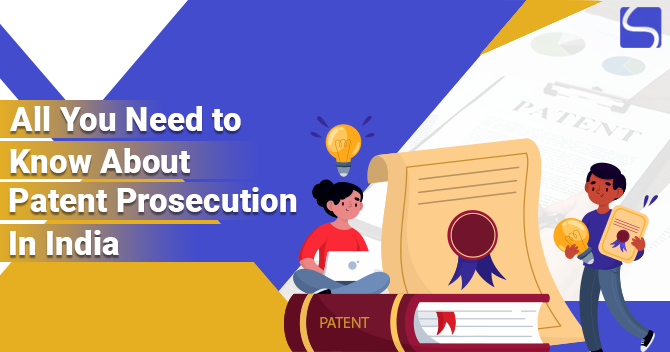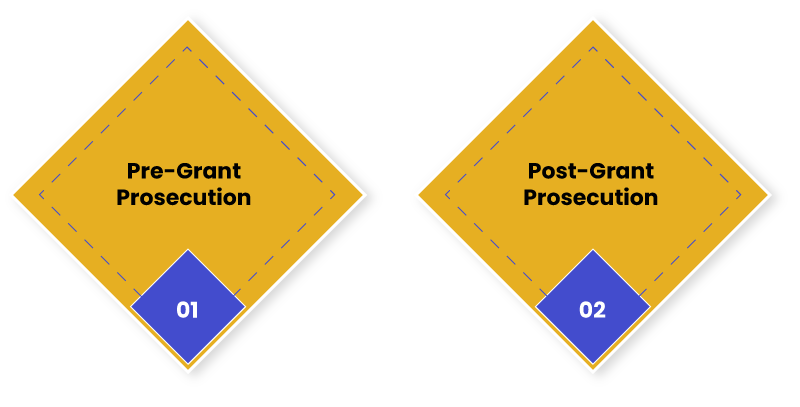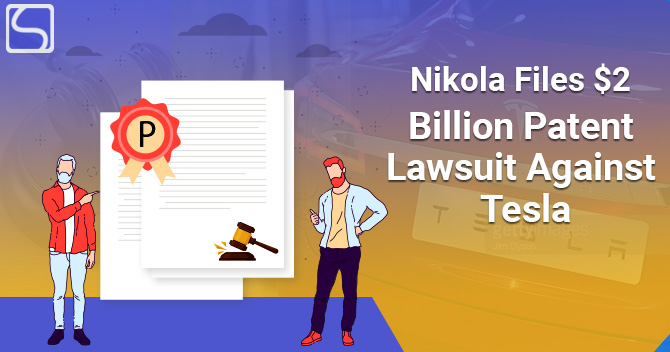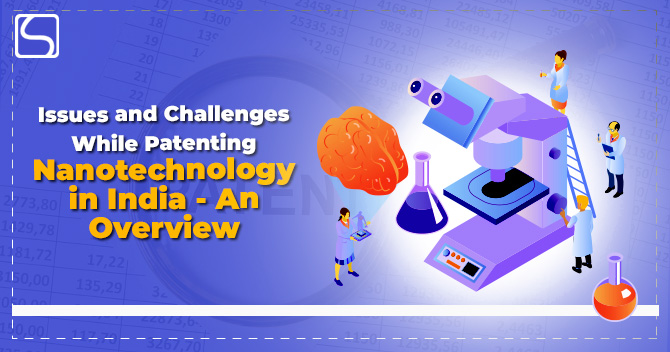All You Need to Know About Patent Prosecution in India

Karan Singh | Updated: Sep 27, 2021 | Category: Patent
Patent Prosecution involves arguing for the patentability of your invented devices, machines, systems or methods. This begins with applying for Patent Registration and receiving a Patent from suitable Government Agencies. It also involves asserting the uniqueness of your IP through the submission of supplementary materials, comprising detailed instructions and design blueprints. Since the process of Patent Prosecution in India is time exhaustive and often includes negotiations with Patent examiners, it becomes vital to know the primary mechanism of the Patent Prosecution system in India for a smoother business journey. Scroll down to check the Patent Prosecution in India.
Table of Contents
What are the Fundamentals of Patent Prosecution in India?
Every Patent Prosecution in India starts with filing an application for Patent Registration before the IPO or Indian Patent Office. After filing the Patent application, the Patent Office examines all the documents to confirm the completeness of all the necessities. Thereafter, the Patent application is sent for a technical examination to check or verify whether the invention or creation meets the three basic requirements of patentability, i.e.;
- Originality.
- Uniqueness.
- Industrial applicability.
At this examination stage, the examiner having capability in the particular technical domain judiciously examines the Patent application. Suppose the examiner has any objection in terms of formal necessities or patentability in the Patent application. In that case, they include those objections in an examination report and send it to the candidate or their representatives to submit their response within the specific time.
What are the Phases of Patent Prosecution in India?
Patent Prosecution in India is divided into two different phases. The first phase is Pre-Grant Prosecution that entails the examination process which Indian Patent Office conducts. This also entails the issuance of an examination report by the Indian Patent Office and drafting & filing a response to the report within the time limit. If the examiner is not happy with the arguments submitted in the response, then they issue a hearing notice. Pre-grant oppositions, after which the Patent application proceeds for a grant or rejection, are also entailed in the first phase. Now, the second phase is the Post-Grant Prosecution that takes place after the issuance of the Patent. This may comprise Post-Grant amendments and Post-grant oppositions.

Pre-Grant Prosecution
- Filing the Application: An application for Patent Registration must be filed with the IPO to get a Patent License. The Patent application can be a non-provision /complete Patent application or Provisional Patent. In India, Patent Office functions from four jurisdictions, i.e., Delhi, Mumbai, Kolkata, and Chennai. The Patent application should be filed at the suitable jurisdiction, which is decided on the following requirements:
- The place of residence of applicant, domicile or place of business (first applicant or candidate in case of joint applicants) or,
- The place from where an invention started or,
- In the case of an overseas candidate, the address for service in India given by the candidate.
Once the Non-Provisional Patent application is drafted correctly and filed with the Patent Office with all the vita documents along with the specified fees, the Patent Office assigns a distinctive Patent application number and priority date or filing date to the application for the future and for record purposes. Such 1st filed applications are also termed as “Priority Application“, and its filing date is referred to as “Priority Date“. Generally, after the expiration of the Patent, it gets published in the Official Gazette of India and falls under the public domain. To track the complete process fast, a request for publication (Form-9) can be filed any time after filing the Patent application with the IPO. The Patent application gets published within one month from the filing date, such as to request. The applicant gets all the exclusive rights of the Patent from the publication date of an application. But, these Patent rights can be claimed only if the Patent application is granted into a Patent and only after the final grant.
- Patent Search and Examination: This is the most vital step of the process of Patent Prosecution in India that decides the outcome of a Patent application. At this step, the IPO examines all the relevant documents, and the examiners conduct an international patentability search based on the significant features of the invention to check for any closet prior art that is pertinent to the Patent application in question.
Based on these prior arts, the Patent examiner decides whether the invention for which an application has been filed is unique, creative and competent of industrial application. Moreover, the examiner also checks those inventions that are strictly excluded from patentability and are termed as “non-patentable Inventions”. Ordinarily, the examination stage of Patent takes three to six years. However, for some applicants, this examination process can be fastened to reduce the time to eight months to two years, given the file a request for expedited examination of their application. For filing the accelerated examination request, the Patent application requires to be already published.
In case it is not published, then a request for early publication must be filed. The criteria for filing the facilitated examination request comprise:
- The applicant is a start-up or small company;
- The applicant has selected India as an IPEA (International Preliminary Examining Authority) or ISA (International Searching Authority) in an equivalent PCT application;
- Application is a Government Department or an organisation that is controlled or funded by the Government;
- Application is eligible under a bilateral agreement between an overseas Patent Office and Indian Patent Office;
- The applicant is an appropriate educational institution that is regulated by the Government;
- The applicant is a female, or in the case of joint applicants where all the applicants are ordinary people, at least one of the applicants is female.
- Issuance of Examination Report: If the Patent examiner finds any error or mistake or falls within the range of non-patentable inventions, they involve such objection in the report and send it to the applicant or their representatives.
- Response to the Report: It is vital to remember that sometimes a candidate may decide to modify or change the claims, requirements, or drawings. Such changes should remain in the ambit of the actual Patent application, and the addition of any new subject matter should be severely avoided. After getting the response, the Patent examiner checks all the changes or arguments that the applicant has submitted & proceeds to the next stage.
- Hearing: If the Patent examiner is pleased with the changes or arguments, the examiner proceeds further by giving a Patent Certificate to the applicant. However, suppose the Patent examiner is not satisfied with the response of the applicant to the examination report. In that case, they can issue a 2nd report or a hearing notice to solve the issue. The applicant gets another chance to submit their response to the 2nd examination report or attend for hearing before the examiner and file a hearing submission within the time limit.
- Pre–Grant Opposition: Usually, search & examination mainly take place between the applicant & the examiner. But, in some jurisdictions like India, any 3rd party called “Opponent” can oppose the grant of Patent based on definite grounds. Under Patent Act (Section 25 (1)), a Pre-Grant opposition can be filed by any individual without paying fees. The Pre-Grant Opposition’s proceeding involves both parties’ filing or reply, statement, and relevant evidence. Based on the virtues of the Pre-Grant Opposition, the examiner sends a notice to the applicant for their response to the opposition. Generally, the parties request a hearing before the examiner before he or she passes any decision for that particular application.
- Examiner’s Decision: Once the examiner checks all the relevant documents and makes the final decision whether to proceed with the refusal or grant. In the case of Post-Grant Opposition has been filed against an application, then a hearing notice is issued to both the opponent & the applicant before passing the final order.
Post-Grant Prosecution
- Post-Grant Opposition: Under Patent Act (Section 25 (2)), a Post-Grant Opposition can be filed after the Patent grant but within one year from the publication date of the grant of Patent based on the grounds specified under the said section. Unlike the Pre-Grant Opposition, Post-Grant Opposition can be filed by any interested individual only, and they have to pay the official fees based on the company’s status. Another difference between the two oppositions lies in the Opposition Board’s formation at the IPO to review the documents submitted by the Patent Owner and the opponent and in providing a suggestion in the Post-Grant Opposition. Afterwards, the examiner gives a hearing notice to both the Patentee and the opponent and decides whether the Patent can be changed, maintained, or revoked.
- Post–Grant Amendments: Under Section 57 and 59 of the Patent Act facilitates the provision of both pre and post-grant amendments. Section 59 tells that the said amendments should fulfil the following requirements:
- Changes should be by means of correction, illustration, or disclaimer;
- Amendments to the claims or specification shouldn’t go far away from the subject matter of originally filed specification or claims;
- Amendments should be made for the fact incorporation.
Following are the details that should be included in such amendments:
- Changes in name, address and the address for service;
- Amendments or changes in the full specification comprising claims, description, and priority claim date.
Further, Section 78 of the Patent Act[1] allows the examiner to correct any clerical mistakes, which may either be requested by any individual interested or even without such a request.
Difference Between Patent Litigation and Patent Prosecution in India
Regardless of their name Patent Prosecution in India is not an official action, at least, not in the way that term would generally suggest in a setting outside of Intellectual Property Law. In simple terms, the process is not established against a defendant; that would be Patent Litigation, which can only occur after you have a consented Patent that comes into danger as an outcome of someone’s act of violation or infringement against it.
Conclusion
The process of Patent Prosecution in India is an ordeal if mishandled even in the slightest, but it doesn’t have to be, and the Patent Prosecution In India decides the Patent application’s fate. So, it is crucial to have a robust lawful team by your side that helps you and shows your application at each stage because even the small negligence may result in refusal or abandonment of the application.
Read our article:What are the Different Ways to Reduce Patent Protection Expenses?














